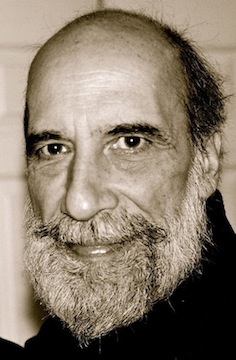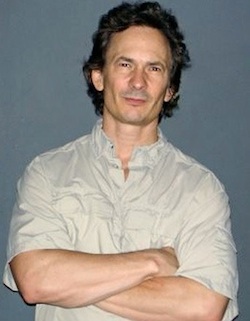
| Jacket 40 — Late 2010 | Jacket 40 Contents | Jacket Homepage | Search Jacket |
This piece is about 4 printed pages long.
It is copyright © Forrest Gander and Jacket magazine 2010. See our [»»] Copyright notice.
The Internet address of this page is http://jacketmagazine.com/40/r-zurita-rb-gander.shtml
Raúl Zurita
Purgatory (A Bilingual Edition)
reviewed by
Forrest Gander
University of California Press, (Not available in Chile) Paperback, 136 pages: ISBN: 9780520259737: November 2009: USD$19.95, £13.95

Raúl Zurita, photo by Valerie Mejer
1
It may be hard to imagine now the moment in which this book was written or the effect it had on its time. By the 1970’s, Latin American poetry had been so fine-tuned by Pablo Neruda’s persuasive Technicolor lyricism that to think of a poem was to think of a poem that sounded like Neruda. It took Nicanor Parra’s bravado, his cranky, hilariously vernacular Anti-Poems, to open a way for younger poets. But even at that, Parra’s poems of the 1970’s looked mostly like poems.
2
Raúl Zurita’s Purgatory was lobbed into Santiago like a smoking chunk of volcanic basalt that so reeked of the underworld it reminded people — the couples going to movies despite the disappearances, the writers arguing about structuralism while other writers were tortured, the conflicted who could still arrange exile, the enraged youths plotting acts of resistance — that they were alike, suffering a hellish after-life in which their souls were at stake.
3
Purgatory doesn’t look anything like a conventional lyric poem. It is orchestrated like an opera, a dramatic performative work in multiple voices with essential props — an encephalogram, a photograph, a Xeroxed medical report, drawings, footnotes, diagrams, equations. Beginning “In the Middle of the Journey” like Dante’s eponymous masterpiece, Zurita’s Purgatory is staged in the Atacama Desert, in the pampas, in fields of hunger and delirium, in the imagining — at a time of crisis — of a way out, some possible future. Like American poet Charles Reznikoff, who looks “Among the heaps of brick and plaster” to find “a girder, still itself among the rubbish,” [1] Zurita gazes at the strafed wreckage of self and country with the hope that he might yet find some durable faith to bind himself, and all of us, to the world. To do this, Zurita has to position himself along the razor-edge of many borders — the borders of habitable landscapes, of sanity, of normative grammar, of identity, gender, and sexuality. Purgatory is called a poem and I take it to be one, but it is also a work that goes over the borders of genre.
4
What is it like to live in an epoch when a coup d’état transforms democracy into a brutal police state in which civil liberties are suspended and human rights are violated on a massive scale? After General Augusto Pinochet appointed himself President of the Government Junta on September 11, 1973, hundreds of thousands of Chileans went into exile, some eighty thousand who stayed were imprisoned without trials, thousands more were tortured and killed, hundreds were chopped into pieces and dropped from helicopters into the mouths of volcanoes and into the shark-riven sea.
5
Raúl Zurita was 23 in 1973. He was a poet and the father of three children. He was afraid he was losing his mind. His material was given to him; he didn’t have any choice about it. The coup d’état against Allende and the subsequent Janus-faced days of ordinary routine and pervasive savagery are the defining events of his life. All of Zurita’s work starts there, in violence, rupture, aporia, love, and the possibility of redemption. The mark of his genius is that in Purgatory, and in the considerable body of work that has come after it, Zurita blazes a radical new literary form equal to the demands of his — and our — historical moment.
6
Before its publication as a book in 1979, Purgatory appeared in 1975 in the magazine Manuscritos. It was an immediate sensation and sparked some of the most important innovations in that vital period of avant-garde art and literature, not only in Chile but throughout Latin America. It still zings with the charge of its signal originality now in Anna Deeny’s excellent English translation.
[1] “Jerusalem, the Golden” from The Poems of Charles Reznikoff

Forrest Gander, photo by Karin Lee
Forrest Gander’s recent books include the novel As a Friend, the book of poems Eye Against Eye, and the translation Firefly Under the Tongue: Selected Poems of Coral Bracho (PEN Translation Prize Finalist), all from New Directions. His forthcoming titles include Core Samples from the World, a collaborative book of photography, haibun, & poetry, and Watchword, a translation of Pura López Colomé’s Villaurrutia Prize-winning poetry.